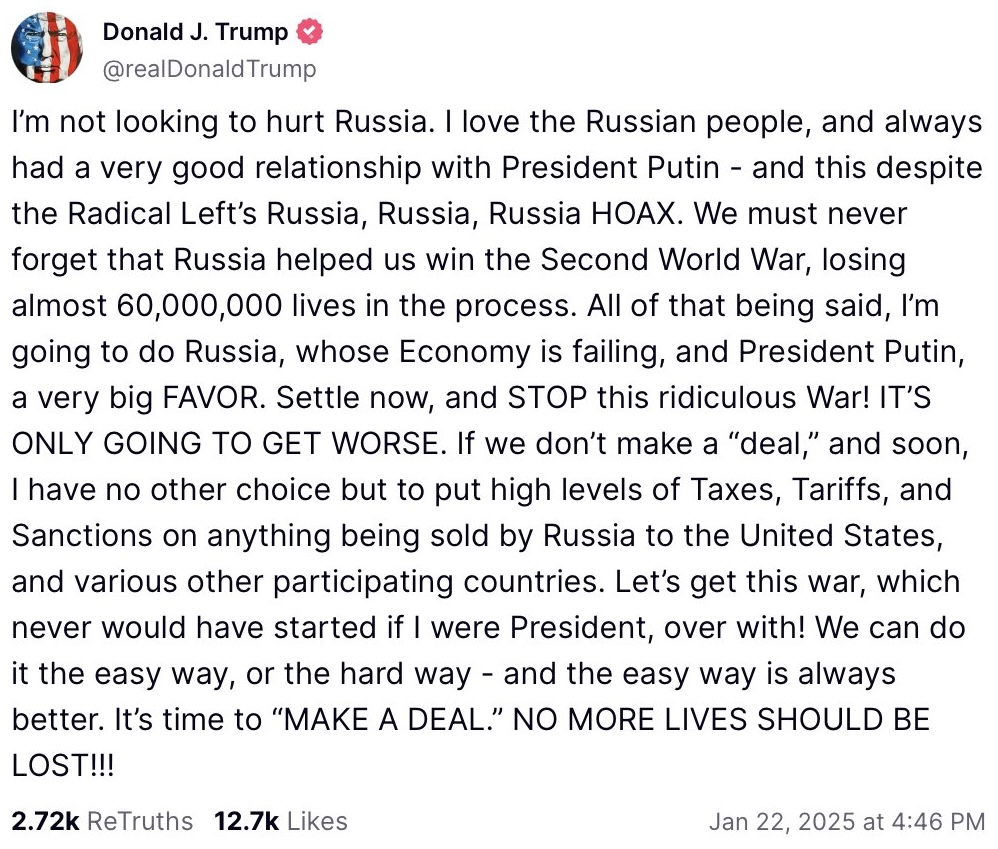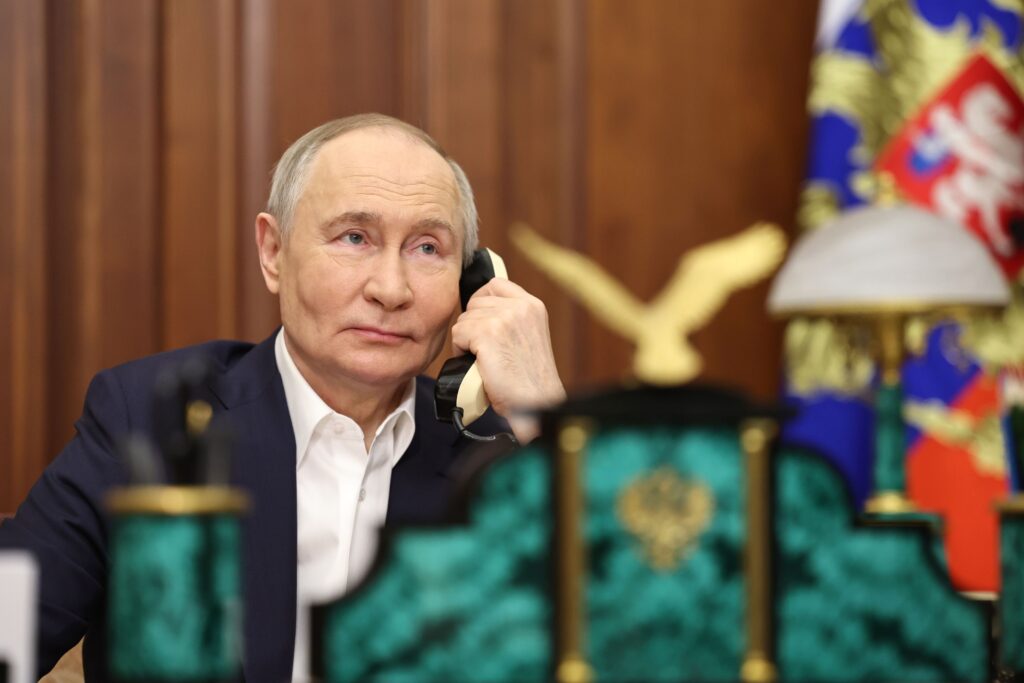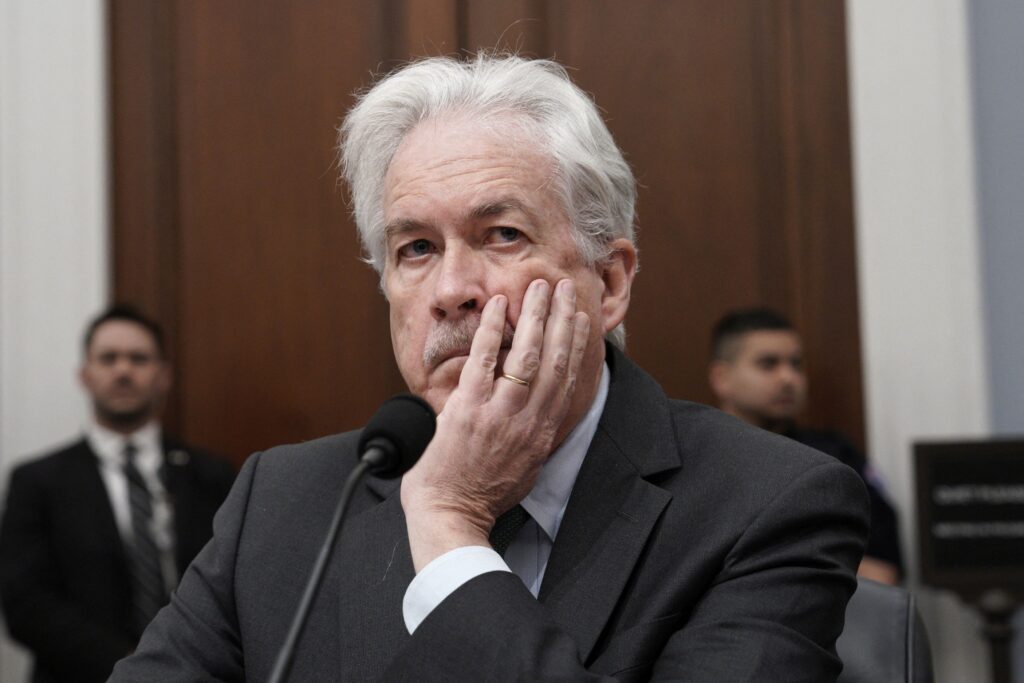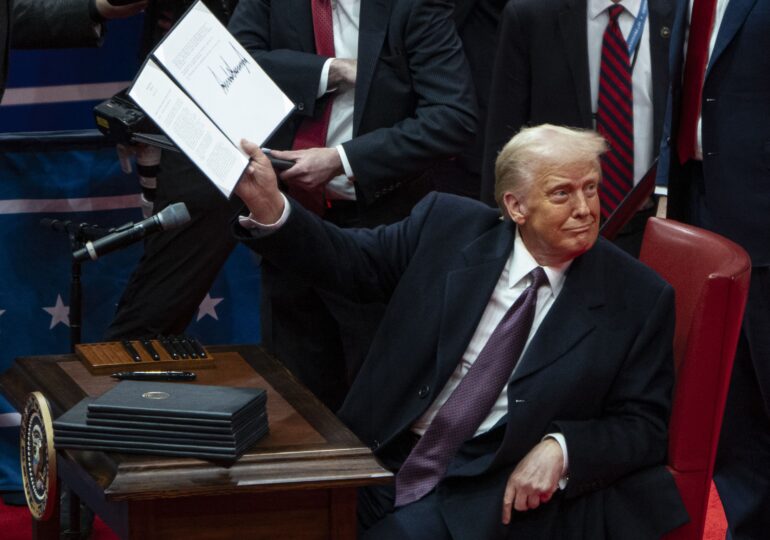Donald Trump’s attitude towards Vladimir Putin and the war in Ukraine visibly changed starting on November 5, 2024, when it became clear that he had won the election against Kamala Harris and will return to the White House.
Something happened in the early days after the Republican leader knew he would be the 47th President of the United States, but what?
Donald Trump, from the beginning of the Russian invasion of Ukraine, positioned himself among those who praised the Kremlin’s army and claimed that it was impossible for Ukraine to resist the onslaught of a military force like the one unleashed by Vladimir Putin.
Afterwards, Donald Trump, in opposition to Joe Biden's strategy, frequently criticized the military aid provided by the US to Ukraine. He accused Zelensky of taking advantage of America's goodwill and lobbied intensely in the first part of last year to influence the decision of the House of Representatives to reject the $60 billion funding for Ukraine.
But after several representatives of the American administration initiated discussions with Republicans and most likely with Donald Trump, his opposition to funding support eased, and the law was passed.
It was a first sign that certain information about the situation in Russia and the conflict in Ukraine had been presented to several Republican lawmakers, and they drew their own conclusions.
Russia's Economy Fails
At the end of September, Zelensky meets with Donald Trump in New York, where the Republican leader says, "Russia and Ukraine must reach an understanding."
This moment marks a slow but steady change in Donald Trump's attitude towards Putin and the military conflict in Ukraine.
It all culminated with the statements made after taking the oath, when the new president, surprising the whole world, gives an "ultimatum" to the Kremlin leader:
"I am not seeking to harm Russia. I love the Russian people and have always had a very good relationship with President Putin - despite the Russia, Russia, Russia lie promoted by the Radical Left," he wrote on his Truth Social network, which he owns.
"We must never forget that Russia helped us win World War II, losing nearly 60,000,000 lives in the process. That being said, I will do Russia, whose economy is failing, and President Putin a great FAVOR," Donald Trump further wrote.
"End it now and STOP this ridiculous war! IT WILL ONLY GET WORSE. If we do not reach an understanding soon, I will have no choice but to impose high levels of taxes, tariffs, and sanctions on anything sold by Russia to the United States and to various other participating countries," the US president emphasized.
"Let's end this war, which would never have started if I were president! We can do things the easy way or the hard way - and the easy way is always better. It's time to MAKE A DEAL. LIVES SHOULD NO LONGER BE LOST!!!," the American leader conveyed to Putin.
The above text represents the harshest, longest, and most in-depth criticism ever directed by Donald Trump at the Russian president.

Since the 2016 election campaign, when the Republican candidate publicly sought scandalous information about Hillary Clinton, in the context where Kremlin agents had obtained messages and electronic communications from the Democratic Party by infiltrating employees' computers, and up to now, Donald Trump has never criticized, threatened, or pressured Putin.
A Risky Decision
The American president's statement caused a shock in Moscow, but also in the entire political network supporting Russia's objectives, funded by the Kremlin both in Europe and in the US.
Overnight, there was a total blockage in the propaganda system because the mechanism through which Russia covered its agents of influence in Trump supporters, conservative militants, and far-right activists, was blocked.
Trump's image, his political values, his actions could no longer be superimposed over those of Vladimir Putin, projecting into the collective consciousness the fact that the two are similar and support each other.

The most important question of the moment remains: what caused Donald Trump's major attitude change towards Russia?
The answer is a complicated one, and it will probably take years before a clear picture of the sequence of events that brought humanity to this point is realized. However, to shed at least a few small rays of light in the dark and convoluted labyrinth of the world we live in, we must go back three years, to the period before Vladimir Putin made the decision to invade Ukraine.
At that time, the concept of "strategic declassification" appeared and was used for the first time, through which William Burns, the CIA director, transmitted information to the US administration and beyond that could be made public to deter Russia's military actions.
Thus, the general public and political leaders learned from the US government representatives, as well as from the media or social networks, about the number of Russian soldiers massed at the Ukrainian border, satellite images of troop deployments, lists of military equipment, and attack strategies.
An Interaction Between People and Technology
In addition to this information, Vladimir Putin received another clue that he did not take into account, that of facing a new cycle of technological development - the emergence of artificial intelligence.
"And yet, no matter how much the world changes, espionage remains an interaction between people and technology," wrote William Burns, the CIA director, in an article published in Foreign Affairs magazine in January 2024.
"There will continue to be secrets that only people can collect and clandestine operations that only people can carry out. Technological advancements, especially in the field of signals intelligence (SIGINT), have not rendered such human operations irrelevant, as some have predicted, but have instead revolutionized how they are conducted. To be an effective intelligence service in the 21st century, the CIA must combine mastery of new technologies with the abilities of direct human interaction and individual courage, which have always been at the heart of our profession," Burns further wrote.
Open AI company officially announced the development of its first artificial intelligence model, GPT-2, on February 14, 2019. This model was the first significant step in natural language processing. Open AI continued to improve the created models, launching GPT-3 in June 2020 and GPT-4 in March 2023.

Comparing these two pieces of information, it is evident that at the time the conflict began, the US government had access to data processing power that Russia could not even dream of.
...what the CIA does with the information it collects is also changing. Strategic declassification, the intentional disclosure of secrets to undermine rivals and mobilize allies, has become an even more powerful tool for political decision-makers. Its use does not mean recklessly endangering the sources or methods used to collect information, but rather judiciously opposing the reflexive tendency to keep everything classified. The US intelligence community is also learning the increasing value of intelligence diplomacy, gaining a new understanding of how its efforts to support allies and counter adversaries can bolster political decision-makers...
William Burns, former CIA director
The process of "strategic declassification" would have been impossible without such powerful information processing models that calculate in detail the impact, possible risks of revealing information, dangers for those involved, and reactions from the targeted party.
Russia Is Not in a Favorable Situation
The major technological gap recorded at that time in the information field allowed Ukraine to survive, transforming it in three years from a certain victim in front of Russia into a strong fortress of Europe and the Western world.
Donald Trump's change in attitude has at least an indirect connection to the reports received from American agencies, and from his reaction, transformation, and reporting on Russia, the public learned that Vladimir Putin has more and graver problems than those that can be observed with the naked eye.
Thus, the haste with which the American president announced a $500 billion investment in developing artificial intelligence projects can also be interpreted, a rush that is also observed in the UK government and the European Commission, concerned with riding the wave of the new technological revolution.
It's not clear whether Donald Trump will succeed in bringing about a ceasefire in Ukraine, as he promised, but the fact that he has put pressure on Vladimir Putin and his allies means that Russia is not in a favorable position, and the American president has more to gain by distancing himself from Moscow than by offering a way to continue the war.

